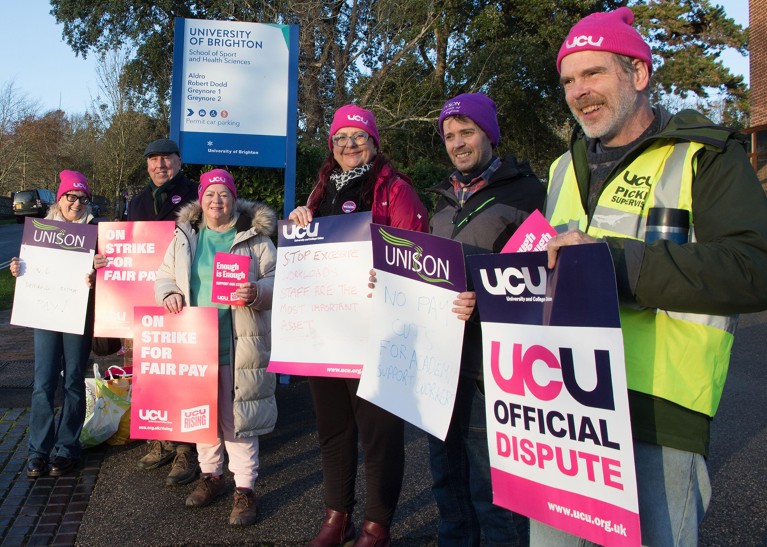
Staff members at the University of Brighton, UK, took action in pursuit of better pay.Credit: Newspics UK South/Alamy
Academics who quit their jobs over growing disillusionment with the workplace say that the COVID-19 pandemic was a “wake-up bomb”, according to a study of UK higher-education professionals.
The study1, published last month in Higher Education, found that the pandemic had a role in intensifying academics’ disenchantment with their work, particularly in regard to systemic abuses—such as bullying, discrimination, lack of support and long hours—that had once been tolerated and accepted as normal.
A team of researchers carried out an online survey in September 2022 and received 781 responses. Of these, 167 were from academics who had left the sector since January 2020, two months before the pandemic was declared. Respondents cited as reasons for leaving a decline in the quality of academic management; the erosion of values and meaning attached to their work; and a sense of being ‘trapped’ in academia.
But the root cause of attrition was ‘toxic’ management culture, say the paper’s authors, who suggest that adopting a more inclusive leadership style and moving away from over-reliance on performance-based management and evaluation could help to remedy the issue.
Of those who had left, 39% of respondents were either self-employed or working in another sector; 15% were employed at a non-UK university; 17% were unemployed; and 12% had retired, among other responses.
Lead author Richard Watermeyer, a higher-education researcher at the University of Bristol, UK, says that the COVID-19 pandemic put a spotlight on the issues at work that staff members could not put up with.
Training: getting an academic research position
“What we saw was intensification of long-seated problems,” he adds. “The pandemic was a particular peak point. It provided that wake-up bomb, an awakening to say there are aspects of our professional practice and our professional lives and the conditions in which we work that we are no longer willing to tolerate.”
One respondent described COVID-19 as a much-needed “rude awakening”. Another mentioned “general uncaringness” from colleagues and management, despite a lot of rhetoric about promoting employee well-being. A third described working for 70 hours each week during term time.
Strife and strikes
Discontent in the sector has continued since a national strike by tens of thousands of members of the University and College Union (UCU), based in London, took place in 2022 and 2023 in a dispute over pay, pensions cuts, job security and workload. The union did not secure a sufficient turnout to continue industrial action into the next academic year, but despite this, several local demonstrations continued.
For example, a dispute at the University of Brighton was settled last November after 129 days of strike action in protest against senior management’s plans to make up to 130 staff members redundant, to save £7.3 million (US$9.3 million) in staffing costs. Some 400 academics’ positions were at risk.
Next month, a five-day strike is planned at Goldsmiths, University of London, where 97 academic posts are at risk of being axed. In April, the UCU announced a boycott of all work at Goldsmiths related to marking and assessment, and in June it urged academics not to apply for jobs or speak at conferences at the institution.
A spokesperson for Goldsmiths declined to comment on the industrial action, instead referencing the institution’s Transformation Programme plan, which says: “As part of our work to secure the college’s future, we need to lower our spending to ensure we are financially sustainable. We have secured some £10.1 million in savings through a range of measures but need to go further. Regrettably, we have had to propose redundancies in academic departments to lower our costs.”
Troy Heffernan, whose research focus at the University of Manchester, UK, includes inequities in higher education, published a study2 in 2018, looking at academics’ career plans. He found that many intended to either retire or leave academia. He is now conducting a study with colleagues at the University of Melbourne, Australia, examining the ‘turning points’ — including the impact of relationship breakdowns, illness and bereavement — in academic careers.
Heffernan says: “What we found, as they did in the Higher Education article, is that COVID was a single global turning point for many.”
Heffernan says the level of disillusionment in academia is clear, with exploitation and favouritism — rather than merit — at the core of how many people view the path to success.
“Largely regardless of location, age or career stage, COVID made the entire academic workforce look at themselves and think what’s important — and for many (at least temporarily), the answer was not dedicating their life to academia and placing the academy above themselves or their family.”
A new dawn?
Aline Courtois, whose research focus at the University of Bath, UK, includes precarity in academia and international mobility, says: “What happened during the pandemic was that some staff members who were on temporary contracts lost their job, so their contracts were not renewed. That is still happening.”
Courtois says these reluctant departures created work for those who stayed behind, adding: “I am not surprised to hear about those feelings of how management, workload and autonomy were made worse by the pandemic.”
“Some people leave, but also universities tend not to hire or replace them, or do not replace them like for like.”
The election of a new UK government last month, in which Labour defeated the Conservatives, who had held power for 14 years, could lead to a change in attitude towards higher education and its staff — but there will be caveats, says Watermeyer, adding that neither party has been willing to address funding in academia.
“You have got a more receptive government now, and those within UK higher education are perhaps more positive that there’s a conversation that’s to be had with the new government, which I don’t think was quite so available previously,” he says.


